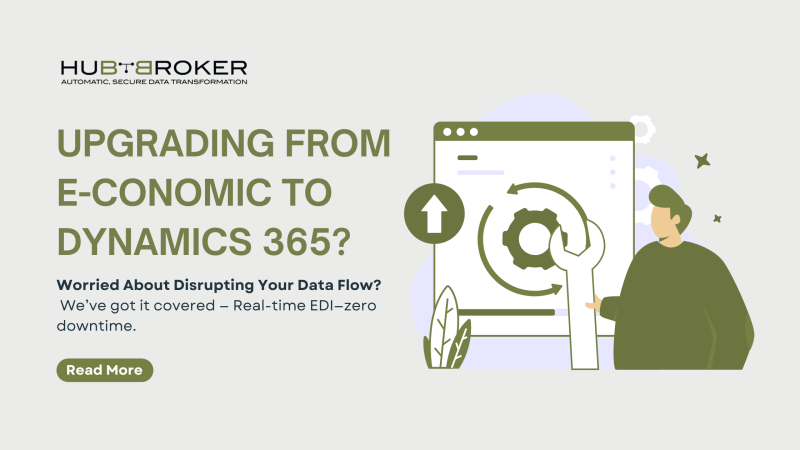Switching from economic to Microsoft Dynamics 365 doesn’t simply mean moving to a different ERP system. It’s a step towards scaling your business, automating processes, and ensuring compliance.
If your business is outgrowing Excel’s basic features and wants a more powerful ERP to handle future challenges with greater automation and customization, Dynamics 365 will be a great next step.
Why Businesses Upgrade to Microsoft Dynamics 365?

Many small to mid-sized companies in Europe, especially Germany, Scandinavia, and Benelux, have started using e-conomics because of its ease of use and low-cost entry. As they grow, however, they start to run into limitations.
Several Compelling Factors Likely Influence this Evolving Landscape:
The Allure Of the Integrated Ecosystem. In the interconnected world of business today, seamless integration is essential. Microsoft 365 Business Central has a distinct advantage because it integrates deeply with the familiar Microsoft ecosystem. Imagine that your accounting data flows seamlessly into your Excel reports. Your sales team collaborates through Teams, with real-time updates to inventory, and you have Power BI dashboards for your business intelligence. All of this is possible on a single platform. This level of integration is a great way to boost efficiency and give a comprehensive view of your business operations.
1. Beyond Basic Accounting:
Power of a Real ERP, Microsoft 365 Business Central, on the other hand, excels at Enterprise Resource Planning. It covers a wider range of business functions than just finance.
2. Supply chain management:
Streamlining inventory, warehouse, and procurement operations.
3. CRM (Customer Relationship Management):
Managing opportunities, leads, and customer interactions.
4. Project management:
Tracking costs, resources, and timelines for projects.
5. Manufacturing:
Planning and execution of production (in certain versions). Business Central is a platform that can be scaled to meet the needs of growing Danish companies with complex requirements.
6. Riding the Cloud Wave:
Cloud-based solutions are a global trend, and Denmark does not lag. Cloud ERPs have many benefits.
7. Accessibility:
Access to your data and systems from anywhere via an internet connection.
8. Scalability:
Adjust resources easily based on business needs.
9. Reduced Infrastructure:
Lower initial investment and less dependence on internal IT infrastructure.
10. Automatic updates:
Get the latest features and patches for security without any manual intervention. Microsoft’s commitment to the Azure cloud platform makes Business Central an attractive cloud-native solution. Visma offers cloud-based solutions such as Visma.net. However, Business Central’s tight integration with Microsoft 365 gives it a distinct advantage for organizations that have already invested in the ecosystem.
11. The Advantage of the Modern Workplace:
Microsoft 365 offers more than Office apps; it is a platform that supports modern work. When combined with Business Central features like Teams for collaboration, SharePoint for document management, and Power Automate to automate workflows, you get a powerful digital workspace. This synergy improves communication, streamlines workflows, and increases overall productivity.
12. Navigating Regulatory Changes:
The recent implementation of the new Danish Accounting Law (“Arsregnskabsloven”) might be prompting businesses to re-evaluate their financial systems. Modern ERPs, such as Business Central, are designed to meet compliance and reporting needs. This can help businesses adhere to changing regulations and make the transition easier.
Why Danish Companies are Outgrowing e-conomic?
E-conomic is the accounting software of choice for countless Danish small and medium-sized companies. It is easy to use, affordable, and perfect for basic financial management. It was like a starter home that served its purpose well for many years. Just as a growing family will eventually need more space, so too will expanding businesses. Their trusted accounting software may not be able to keep up.
-
Beyond Bookkeeping, You Need More:
As your business grows, the financial aspect becomes only one part of an increasingly complex puzzle. You’re no longer just tracking expenses and income. Now you have to manage complex inventory, deal with customer relationships and leads, supervise intricate projects, or dive into manufacturing. While E-conomic is great for accounting, it doesn’t have robust modules to meet these operational needs. You’re left with a mess of different systems and manual workarounds. The
-
Struggle with Silos:
If your sales team is using one system and your warehouse another, while your finance department is using e-conomic you have created “data silos.” The information doesn’t flow easily, resulting in duplicate data entry, outdated reporting, and fragmented views of your business. It isn’t easy to make quick decisions, and growth can be slowed down.
-
Growing business means more complexity:
Growing companies don’t simply get bigger, they also get more complicated. More customers, suppliers, and employees. When managing large volumes or complex processes, a system that was designed to be simple can become cumbersome. Once quick and simple, it becomes a bottleneck.
-
Limited Customization to Meet Unique Needs:
Each growing business has its unique workflows, and each one has specific requirements. While economic integrations have limitations, there are often limitations to customizing them to meet your unique operational needs. You may wish you could modify processes, add fields, or create advanced reports within your primary system rather than having to export data and manipulate it elsewhere. Need for deeper insights: Basic financial reports may be sufficient when you are small. As your business grows, you will need more detailed insights on every aspect of it – from profitability to margins and project margins. Basic accounting tools may not have the advanced analytics or real-time dashboards necessary to identify trends, identify potential opportunities, and preempt problems.
The move from economic to a full Enterprise Resource Planning (ERP), such as Microsoft Dynamics 365, is a logical step and one that’s often required. It is about equipping the business with the tools to grow efficiently, take full control, and prepare for future challenges and opportunities.
How HubBroker Makes the Transition Seamless:
Content

Migration Challenges from the E-conomic to MSD 365:
Add content
Maintaining vital data flows and EDI Integrations without disruption. HubBroker solves this by providing pre-built, cloud-based EDI and data integration solutions that work seamlessly with Microsoft Dynamics 365.
How HubBroker Can Help?
-
Real-Time EDI Integration
HubBroker enables the real-time exchange of data between Dynamics 365, your customers, suppliers, marketplaces, or logistics partners: no more batch updates or manual file transfers.
-
Pre-Built Connectors for Dynamics 365
Our connectors plug directly into Microsoft Dynamics 365 Business Central and Finance & Operations. This allows you to get up and running faster without the hassle of custom development.
-
Automated Document Flow
We automate the exchange of purchase orders and invoices. We also automate order confirmations and delivery notes. This saves time and reduces human error.
-
EU Compliance Made Simple
HubBroker makes sure that all documents you send to HubBroker meet EU regulatory standards, including XRechnung PEPPOL and EDIFACT. This allows you to do business across borders in confidence.
-
Industry-Specific Support
HubBroker’s custom integrations are tailored to the exact needs of your industry, whether you’re in retail, wholesale, or logistics. HubBroker supports compliance, scalability, and speed.
[wpforms id=”13955″]
FAQ’s from businesses like yours
Will I lose my data access?
No. HubBroker provides seamless data consistency for e-conomic Dynamics 365.
Do I need a developer on staff?
Not at all. You don’t require technical resources with our prebuilt integrations and hands-on assistance.
How fast can we launch?
Most clients are integrated into the system within 2 to 4 weeks, depending on their complexity.
[wpforms id=”13955″]
Conclusion
Upgrades to Microsoft Dynamics 365 are a great step forward, but they don’t need to be complicated. HubBroker is a powerful tool that helps you upgrade your ERP and future-proof your processes.
- Faster implementation
- Seamless Data Continuity
- End-to-end EDI automation
Supported by a team that knows your industry
HubBroker’s ERP Transition Support Visit to contact us
OCR conversion failed
OCR Result(Auto-Detect)
Translated(English)
N/A
Please select text to grab.
- By HubBroker ApS


